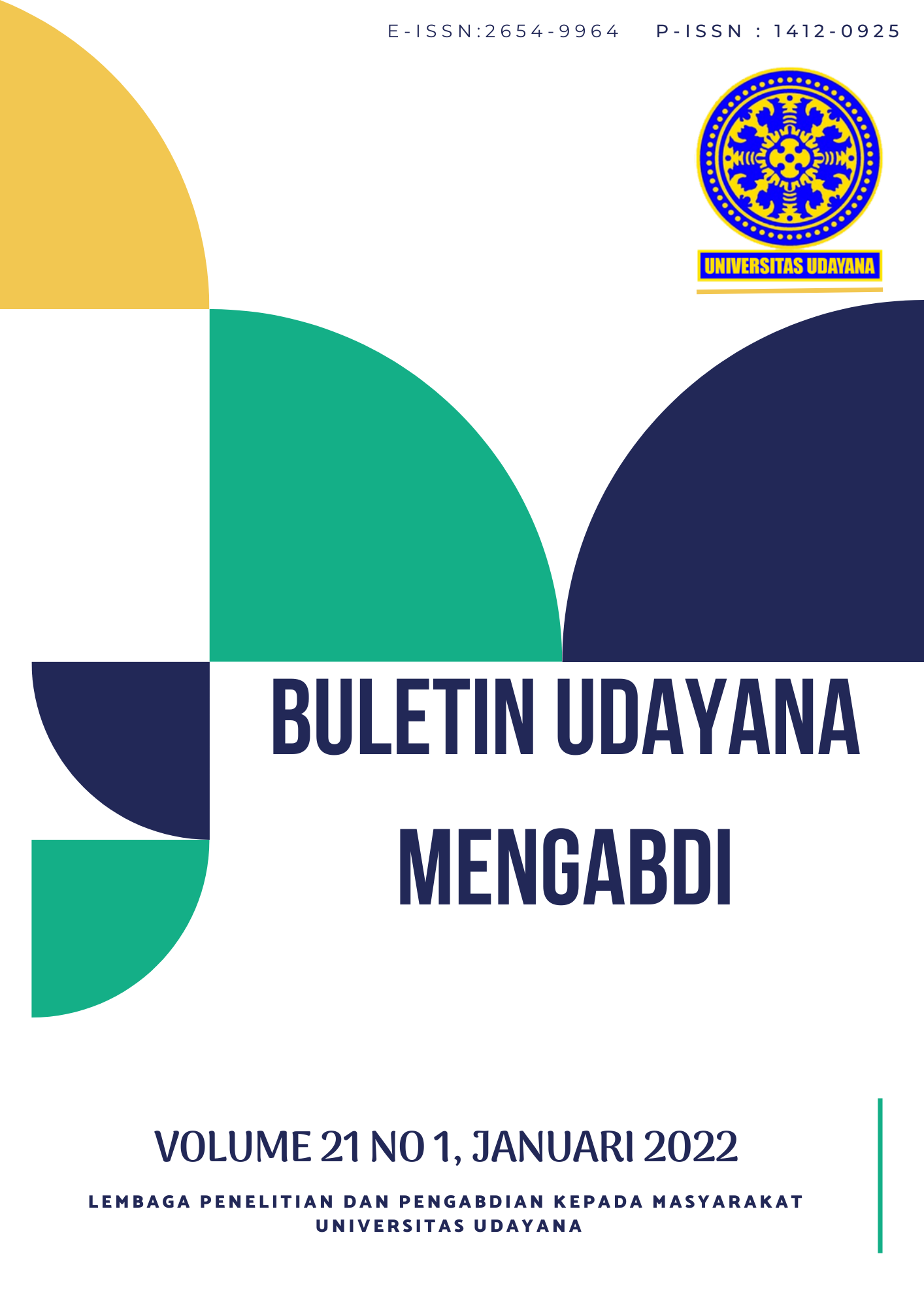PELAYANAN KESEHATAN KOMPREHENSIF BAGI PEKERJA WISATA YANG DIRUMAHKAN SEJAK PANDEMI COVID-19
Abstract
Corona Virus Diseases 2019 (COVID-19) pandemic has caused many tourism workers in Bali to be laid off. This certainly affects the physical and psychological health of the laid-off employees. Employees who are laid off can experience stress. The purpose of this community service is to reduce the stress level of tourist workers who have been laid off since the COVID-19 pandemic in Paksebali Village, Klungkung after being given health education and doing self-hypnosis. This community service is carried out in the form of health services including stress level screening using Depression Anxiety Stress Scales and health education on how to manage stress with self-hypnosis. Lecture, discussion, and simulation methods used in the implementation of health education with a duration of 180 minutes and attended by 70 participants. An online questionnaire was used to collect data describing the stress level of the participants. The description of the stress level of participants before being given treatment was found to be 70% in the normal category. The health education activities went smoothly, the participants seemed to be actively listening, asking questions, answering questions, and participating in the simulations given by the resource persons. Health counseling using lecture, discussion, and simulation methods about managing stress with self-hypnosis is expected to increase participants' knowledge and positive behavior in managing stress during the Covid-19 pandemic.
Keywords: Health Education, Pandemic, Self-hypnosis, Travel Workers
Downloads
References
Elkins, G. R., Barabasz, A. F., & Council, J. R. (2015). American Journal of Clinical Hypnosis Advancing Research and Practice : The Revised APA Division 30 Definition of Hypnosis. (January). https://doi.org/10.1080/00029157.2015.1011465
Fenn, Chacko, N., Thomas, T., Varghese, V. K., & George, S. (2021). Stress, sources of stress and coping during the Covid-19 lockdown: A population study from India. Indian Journal of Social Psychiatry, 37(1), 57. https://doi.org/10.4103/ijsp.ijsp
Fisch, S, Brinkhaus, B., & Teut, M. (2017). Hypnosis in patients with perceived stress – a systematic review. https://doi.org/10.1186/s12906-017-1806-0
Fisch, Silvia, Trivakovi, S., Roll, S., Keller, T., Binting, S., Cree, M., … Teut, M. (2020). Group hypnosis for stress reduction and improved stress coping : a multicenter randomized controlled trial. 6, 1–15.
Hall, R. C. W., Hall, R. C. W., & Chapman, M. J. (2008). The 1995 Kikwit Ebola outbreak: lessons hospitals and physicians can apply to future viral epidemics. General Hospital Psychiatry. https://doi.org/10.1016/j.genhosppsych.2008.05.003
Hammond, D. C. (2010). Hypnosis in the treatment of anxiety- and stress-related disorders. 263–274.
Kadafi, M. (2020). Pariwisata Terpukul Pandemi Covid-19, Bali Kehilangan Devisa Rp9,7 Triliun per Bulan.
Nusa Bali. (2020). 13.772 Karyawan di Denpasar PHK dan Dirumahkan Tanpa Gaji. Retrieved from https://www.nusabali.com/berita/75674/13772-karyawan-di-denpasar-phk-dan-dirumahkan-tanpa-gaji
Rubin, G. J., Potts, H. W. W., & Michie, S. (2010). The impact of communications about swine flu (influenza A HINIv) on public responses to the outbreak: Results from 36 national telephone surveys in the UK. Health Technology Assessment. https://doi.org/10.3310/hta14340-03
Shahbaz, S., Ashraf, M. Z., Zakar, R., Fischer, F., & Zakar, M. Z. (2021). Psychosocial effects of the COVID-19 pandemic and lockdown on university students: Understanding apprehensions through a phenomenographic approach. In PLoS ONE (Vol. 16). https://doi.org/10.1371/journal.pone.0251641
Shevlin, M., McBride, O., Murphy, J., Miller, J. G., Hartman, T. K., Levita, L., … Bentall, R. P. (2020). Anxiety, depression, traumatic stress and COVID-19-related anxiety in the UK general population during the COVID-19 pandemic. BJPsych Open, 6(6), 1–9. https://doi.org/10.1192/bjo.2020.109
Van Bortel, T., Basnayake, A., Wurie, F., Jambai, M., Koroma, A. S., Muana, A. T., … Nellums, L. B. (2016). Psychosocial effects of an Ebola outbreak at individual, community and international levels. Bulletin of the World Health Organization. https://doi.org/10.2471/blt.15.158543

This work is licensed under a Creative Commons Attribution-ShareAlike 4.0 International License.

This work is licensed under a Creative Commons Attribution-ShareAlike 4.0 International License.




.png)


1.png) GARUDA - GARBA RUJUKAN DIGITAL
GARUDA - GARBA RUJUKAN DIGITAL



